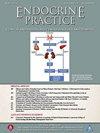2型糖尿病患者糖尿病相关自身抗体的流行病学研究
IF 4.6
3区 医学
Q2 ENDOCRINOLOGY & METABOLISM
引用次数: 0
摘要
目的:糖尿病相关自身抗体对2型糖尿病的分类和治疗的全部意义仍不确定。迄今为止,美国社区样本中自身抗体阳性的数据有限。本研究评估并比较了由内分泌科或初级保健提供者(pcp)管理的社区2型糖尿病患者中糖尿病相关自身抗体的患病率。方法:本单中心横断面研究纳入202例2型糖尿病患者(内分泌102例,PCP 100例),无成人潜伏性自身免疫性糖尿病(LADA)病史。测定谷氨酸脱羧酶-65 (GAD-65)、抗胰岛细胞、胰岛素瘤相关-2、锌转运蛋白8和抗胰岛素抗体。结果:在199名具有完整抗体小组检测结果的参与者中,13.6%的人至少有一种糖尿病相关自身抗体检测呈阳性;由内分泌学家管理的个体(16.0%)的患病率高于pcp(11.1%),但不显著。GAD-65阳性率为4.5%。没有参与者显示抗胰岛细胞自身抗体。在排除另外12名仅抗胰岛素抗体阳性的个体后,其余参与者中有8.0%为自身抗体阳性(中位年龄71岁;BMI中位数为31.8 kg/m2)。结论:在美国社区护理机构的2型糖尿病患者中,糖尿病相关自身抗体的患病率是显著的,并且与内分泌学或PCP实践的管理无关,其中大多数人没有显示LADA表型特征。虽然需要进一步的研究来评估这些发现的临床意义,但有可能2型糖尿病患者主动意识到自身抗体状态可以提供额外的背景,帮助指导治疗决策。本文章由计算机程序翻译,如有差异,请以英文原文为准。
Prevalence of Diabetes-related Autoantibodies Among Individuals With Type 2 Diabetes From Primary Care and Endocrinology Community Practice Settings
Objective
The full implications of diabetes-related autoantibodies for classification and management of type 2 diabetes remain undetermined. To date, there are limited data on autoantibody positivity in community-based samples in the United States. This study assessed and compared the prevalence of diabetes-related autoantibodies in a community-based population of individuals with type 2 diabetes managed by endocrinology or primary care providers (PCPs).
Methods
This single-center cross-sectional study enrolled 202 adults (102 in endocrinology and 100 in PCPs) with type 2 diabetes without a history of latent autoimmune diabetes of adulthood. Glutamic acid decarboyxlase-65, anti-islet cell, insulinoma-associated-2, zinc transporter 8, and anti-insulin antibodies were determined.
Results
Among 199 participants with full antibody panel testing results, 13.6% tested positive for at least one diabetes-related autoantibody; prevalence trended higher, but nonsignificantly, among individuals managed by endocrinologists (16.0%) vs PCPs (11.1%). GAD-65 positivity was 4.5%. No participants displayed anti-islet cell autoantibodies. After excluding an additional 12 individuals positive for only anti-insulin antibodies, 8.0% of the remaining participants were autoantibody-positive (median age, 71 years; median body mass index, 31.8 kg/m2).
Conclusions
The prevalence of diabetes-related autoantibodies in individuals with type 2 diabetes in a U.S. community-based care setting, most of whom did not display LADA phenotype characteristics, was notable and similar regardless of management by endocrinology or PCP practices. Although further studies are needed to assess the clinical implications of these findings, it is possible that proactive awareness of autoantibody status in individuals with type 2 diabetes could provide additional context to help guide treatment decisions.
求助全文
通过发布文献求助,成功后即可免费获取论文全文。
去求助
来源期刊

Endocrine Practice
ENDOCRINOLOGY & METABOLISM-
CiteScore
7.60
自引率
2.40%
发文量
546
审稿时长
41 days
期刊介绍:
Endocrine Practice (ISSN: 1530-891X), a peer-reviewed journal published twelve times a year, is the official journal of the American Association of Clinical Endocrinologists (AACE). The primary mission of Endocrine Practice is to enhance the health care of patients with endocrine diseases through continuing education of practicing endocrinologists.
 求助内容:
求助内容: 应助结果提醒方式:
应助结果提醒方式:


